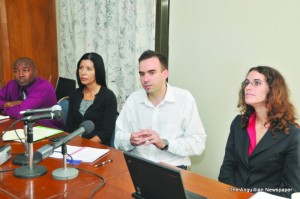
A project, anticipated to continue for 7-10 months, aimed at integrating renewable energy technologies (such as solar and wind power) intoAnguilla’s electricity system, has begun on the island.
The work is being undertaken by CASTALIA Strategic Advisors, a Washington-based company with vast experience in renewables and contracted by Climate and Development Knowledge Network (CDKN), a UK-based development funding agency. It will be necessary to make amendments to the island’s electricity legislation in order to give effect to the integration of the renewable energy technologies. That initiative would reduce the island’s dependence on fossil fuel and ultimately lessen the growing cost of electricity.
A team from CASTALIA Strategic Advisors began a series of meetings this week with Parliamentarians on both sides of the political divide; Executive Council; various Ministry officials; the Anguilla National Energy Committee; Anguilla Electricity Company and Board officials; the Anguilla Hotel and Tourism Association; the Chamber of Commerce and Industry; Anguilla Community College; the Water Corporation and various other stakeholders representing Government, NGOs and the private sector.
In Anguilla, discussing the project, are CASTALIA’s Manager Gianmarco Servetti (and Director of the work in Anguilla), who has done consultations in various Caribbean islands, and Laura Berman, a Senior Analyst with the company, specialising in energy and renewable energy and working particularly in Latin America and the Caribbean. They spoke to reporters at a press conference on Tuesday this week at which also were Beth Barry,Anguilla’s Renewable Energy Coordinator; Larry Franklin, Permanent Secretary, Ministry of Infrastructure; and Crefton Niles, Director of Public Utilities.
“Without Beth Barry and the Anguilla Renewable Office, which is the operating arm of the National Energy Committee, this project would not be possible, so we owe much gratitude to Ms. Barry,” Mr. Niles stated in his introductory remarks. He took the opportunity to welcome the consultants and to briefly speak about their work.
Ms. Barry said the Energy Committee had been working for years to integrate renewable energy intoAnguilla’s electricity system. She was very happy to be working on the project, facilitating the Anguilla Government as it moved forward in obtaining recommendations on legislative change that would create a framework for renewable energy integration. She was also delighted with the assistance of CDKN and CASTALIA.
Ms. Berman said that CASTALIA was an independent consulting firm, focused on infrastructure, and was uniquely qualified to perform the assignment in Anguilla having done similar work in variousCaribbeanislands as well as sustainable geothermal energy consultations and legislation. She also stated that CASTALIA was experienced in drafting energy policies and strategies, reviewing legal and policy framework and other related work.
Ms. Berman, whowas the main presenter of the project, said that in keeping with its terms of reference inAnguilla, CASTALIA’s objectives were “to help implement key elements of the National Energy and Climate Change Policy by recommending how to amend electricity legislation to integrate both large and small-scale renewable energy.” She pointed out that this was important for the Government in order “to improve the wellbeing of the people ofAnguilla.” She noted that while this was one of the primary goals, another was “to ensure that ANGLEC operates as a commercial utility so that, with this renewable energy integration, ANGLEC can continue operating… and providing a cost-effective and reliable electricity supply.”
She added: “One of the primary reasons [of the renewable energy project] is to reduce electricity cost and price volatility. The idea is to do this while also increasing energy security and enhancing environmental sustainability. These are three main reasons why renewable energy integration is a priority for the Government and can be beneficial to the people ofAnguilla.”
Answering questions from media representatives, the other consultant, Mr. Servetti, gave the following explanation: “This assignment will create recommendations on how to improve, as necessary, the framework and the existing rules and regulations. It is not to destroy anything that is good, and already there, but just to see that all the bits and pieces a renewable energy project needs, to be developed, are there.”
He said there was already a complete framework but perhaps designed for another time when renewable energy technologies were not as economically viable as some might now be.
“We will just make sure that all the key things that are needed for the project are in place,” he continued. “You want to able to access the renewable energy source, meaning having access to the wind and the sun. You want to be able to access and develop a site and to be able to cross and acquire lands…The third thing is that you want to be able to do something with the electricity that you generate; so you want to have access to the grid and be able to have a commercial arrangement that allows you [to sell the electricity you generate].”
At the end of this month the CASTALIA consultants will prepare an inception report on their findings. In March they will assessAnguilla’s renewable energy potential using information they collected from stakeholders. The assessment would enable them to recommend improvements to the existing legal and regulatory framework inAnguilla. At the end of March a draft report and recommendations will be prepared. There will be a second trip toAnguillain April when a stakeholder workshop will be held to present the consultants findingsand preliminary recommendations, among other matters. In August will be the final working trip toAnguilla.








